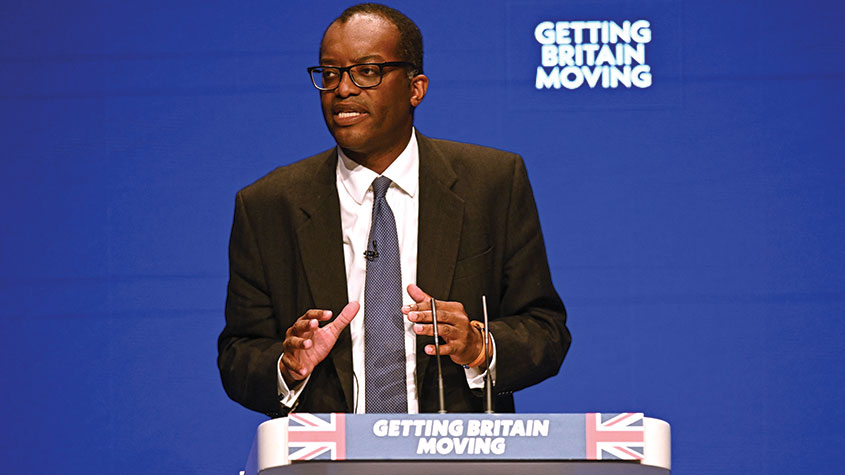May seeks a compromise on Brexit
The PM turns her back on the eurosceptics and reaches out to Jeremy Corbyn. Emily Hohler reports.

Get the latest financial news, insights and expert analysis from our award-winning MoneyWeek team, to help you understand what really matters when it comes to your finances.
You are now subscribed
Your newsletter sign-up was successful
Want to add more newsletters?

Twice daily
MoneyWeek
Get the latest financial news, insights and expert analysis from our award-winning MoneyWeek team, to help you understand what really matters when it comes to your finances.

Four times a week
Look After My Bills
Sign up to our free money-saving newsletter, filled with the latest news and expert advice to help you find the best tips and deals for managing your bills. Start saving today!

Theresa May made "an about-face" in her Brexit strategy on Tuesday by offering to work with the Labour leader, Jeremy Corbyn, an approach that could lead to a closer relationship with the EU, say Max Colchester and Jason Douglas in The Wall Street Journal.
Following a "marathon" seven-hour cabinet meeting, May outlined plans to request a further extension to Article 50, ideally not beyond 22 May to avoid the UK having to take part in European elections. The plan is high-risk for May, who has spent months trying to appease Tory eurosceptics: it threatens to alienate them further and successful talks with Labour are "far from guaranteed".
Kicking the can into Corbyn's face
It's hard to see how any of this can work, says Philip Johnston, also in The Daily Telegraph. Since Corbyn's likely conditions a customs union, single market membership and possibly a second referendum are opposed by "scores" of Tories and will therefore destroy her party, there will inevitably be no agreement. As for the indicative votes, we've already had 12 of those, and "every one has fallen". Now that May has kicked the can "firmly into" Corbyn's face, there's a possibility that the Labour party will "tear itself apart as well", says John Crace in The Guardian.
MoneyWeek
Subscribe to MoneyWeek today and get your first six magazine issues absolutely FREE

Sign up to Money Morning
Don't miss the latest investment and personal finances news, market analysis, plus money-saving tips with our free twice-daily newsletter
Don't miss the latest investment and personal finances news, market analysis, plus money-saving tips with our free twice-daily newsletter
Even if May does manage to achieve a majority for a softer Brexit and the Tory party doesn't implode, her partners in government, Northern Ireland's DUP, will "go ballistic" because it would mean approving May's deal and therefore the Irish backstop, which they regard as "toxic", says Robert Peston in The Spectator.
There are so many other obstacles including persuading voters that it makes sense to start preparations for EU parliamentary elections in the hope of cancelling them at the last minute that I "can find no MP outside of the payroll" who thinks May's plan will work. But whether it does or not, "a Rubicon of sorts has been crossed". May and her ministers "have signalled" that they are so opposed to a default, no-deal Brexit on 12 April that they "will begin a process that could blow up the Tory Party". This "will have huge consequences not least for how long she can remain prime minister".
A general election is looking increasingly likely, says Philip Cowley in The Times. However much the public may not want one, the indicative votes have shown that it may provide a solution. Parliament came close to "agreeing a policy position on a number of occasions" the customs union ballot fell by just three votes but they are all options that "only a handful of MPs from the governing party can accept".
Meanwhile, a majority of Labour MPs "happily backed a confirmatory referendum, a Common Market 2.0 option, and customs union". This suggests that a Labour government "could fairly easily legislate" for a softer Brexit. As for the Conservatives, even if they somehow romped to victory in a 2019 general election, the party is so split that agreement on any form of Brexit stronger than the current deal is hard to imagine. An election might therefore not be "pointless", as many are saying, but it is "difficult to see how it could be good" for the Tories.
Get the latest financial news, insights and expert analysis from our award-winning MoneyWeek team, to help you understand what really matters when it comes to your finances.

Emily has worked as a journalist for more than thirty years and was formerly Assistant Editor of MoneyWeek, which she helped launch in 2000. Prior to this, she was Deputy Features Editor of The Times and a Commissioning Editor for The Independent on Sunday and The Daily Telegraph. She has written for most of the national newspapers including The Times, the Daily and Sunday Telegraph, The Evening Standard and The Daily Mail, She interviewed celebrities weekly for The Sunday Telegraph and wrote a regular column for The Evening Standard. As Political Editor of MoneyWeek, Emily has covered subjects from Brexit to the Gaza war.
Aside from her writing, Emily trained as Nutritional Therapist following her son's diagnosis with Type 1 diabetes in 2011 and now works as a practitioner for Nature Doc, offering one-to-one consultations and running workshops in Oxfordshire.
-
 Should you buy an active ETF?
Should you buy an active ETF?ETFs are often mischaracterised as passive products, but they can be a convenient way to add active management to your portfolio
-
 Power up your pension before 5 April – easy ways to save before the tax year end
Power up your pension before 5 April – easy ways to save before the tax year endWith the end of the tax year looming, pension savers currently have a window to review and maximise what’s going into their retirement funds – we look at how
-
 No peace dividend in Trump's Ukraine plan
No peace dividend in Trump's Ukraine planOpinion An end to fighting in Ukraine will hurt defence shares in the short term, but the boom is likely to continue given US isolationism, says Matthew Lynn
-
 Europe’s new single stock market is no panacea
Europe’s new single stock market is no panaceaOpinion It is hard to see how a single European stock exchange will fix anything. Friedrich Merz is trying his hand at a failed strategy, says Matthew Lynn
-
 Was Margaret Thatcher great for Britain?
Was Margaret Thatcher great for Britain?The 'Iron Lady’ would be celebrating her 100th birthday this month. Margaret Thatcher rose to power in 1979 as the first ever female prime minister and was one of the most controversial leaders in history, but how did her policies shape today’s finances?
-
 Britain’s inflation problem
Britain’s inflation problemInflation in the UK appears to be remaining higher for longer when compared with similar rich countries. Why? And when can we expect a return to normal? Simon Wilson reports.
-
 It’s been 16 years, but the UK economy finally has a chance
It’s been 16 years, but the UK economy finally has a chanceOpinion The UK economy has been dealing with one crisis after another since 2007. Policymakers now have a chance to fix some of the underlying problems holding back growth.
-
 Eurozone inflation hits 10.7% in October
Eurozone inflation hits 10.7% in OctoberNews Inflation across the eurozone hit 10.7% in October. What does it mean for your money?
-
 The “plan for growth”: what Truss and Kwarteng got right
The “plan for growth”: what Truss and Kwarteng got rightOpinion The Tories’ “plan for growth” has got off to a bad start, but their reforms can still transform Britain
-
 Kwasi Kwarteng U-turns on top tax rate decision
Kwasi Kwarteng U-turns on top tax rate decisionNews Kwasi Kwarteng has U-turned on his top tax rate reduction announced in his mini-Budget at the end of September.